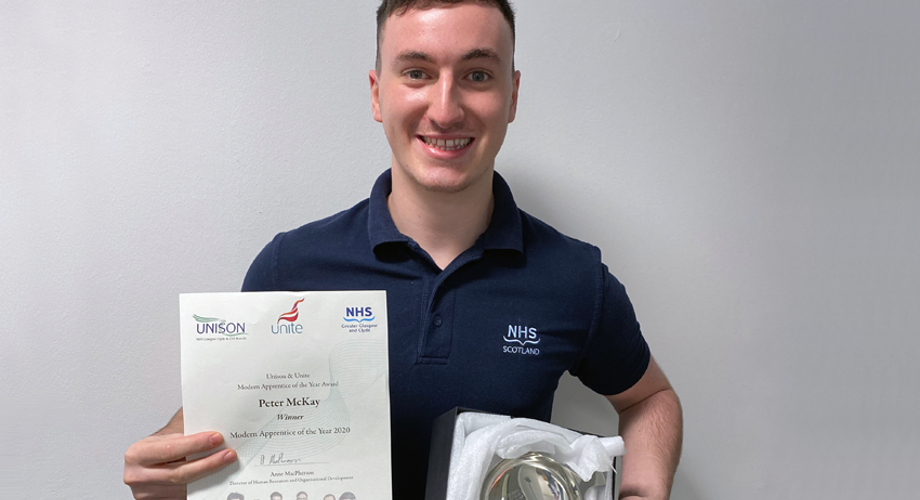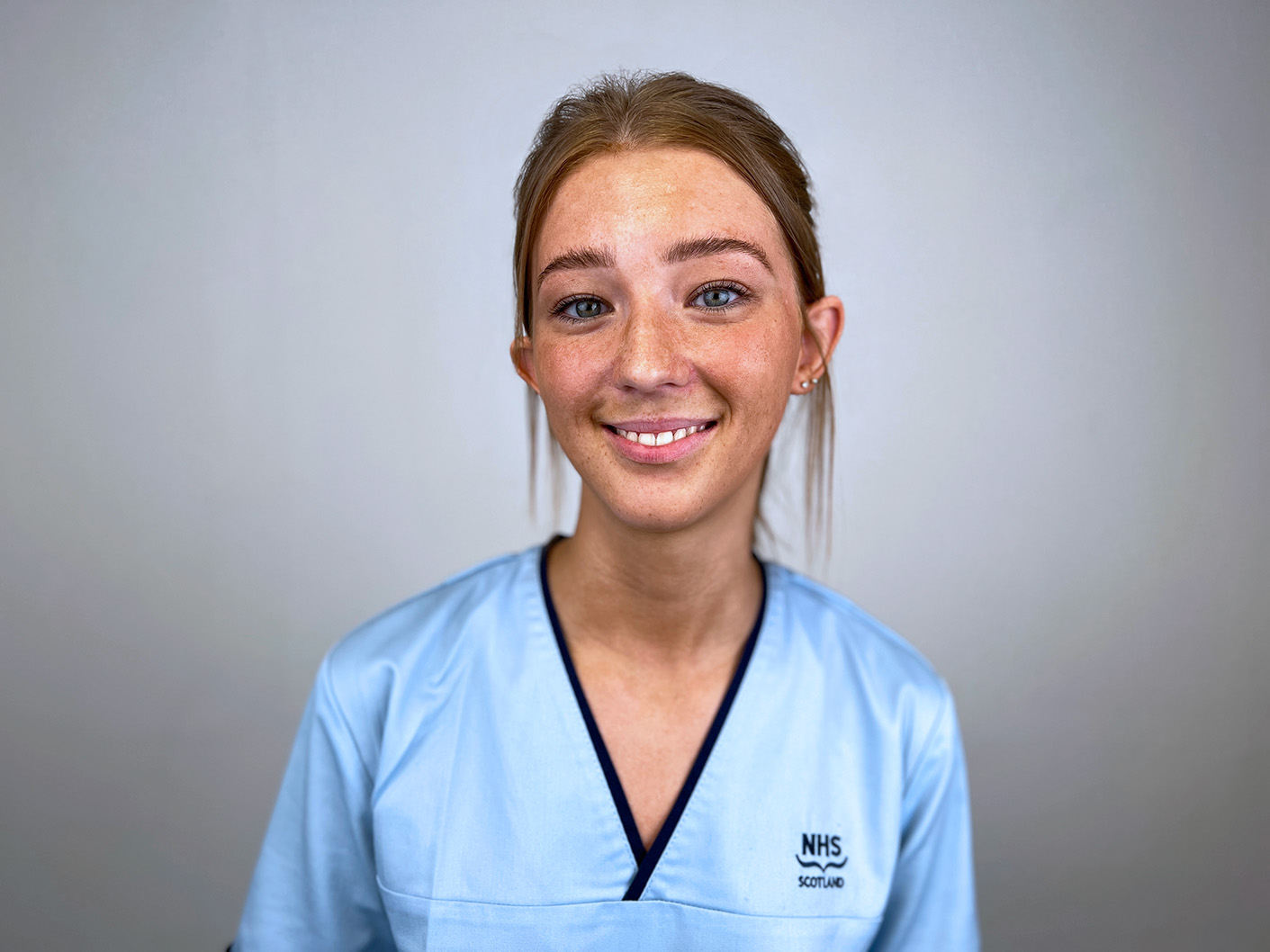
NHSScotland Careers
23 February 2021
•3 min read

Peter's story
Peter is a Modern Apprentice Multi-skilled Technician from the estates department at Gartnavel General Hospital in Glasgow. He works in a maintenance team, learning mechanical and electrical engineering skills as well as plumbing.
Peter shared his career story for Scottish Apprenticeship Week.
How did you first hear about the apprenticeship?
I knew that I wanted to do an engineering apprenticeship when I was in my last year of school. I spoke to a careers adviser and did my own research online. That’s how I found out about apprenticeship opportunities in the NHS. I also went to an open evening at the Queen Elizabeth University Hospital to find out more. From there, I decided to apply.
I was really happy when I was offered an interview. It was the Modern Apprenticeship that I wanted to do. I knew I was going to have the opportunity to learn a wide range of skills.
How has doing an apprenticeship helped you, and how will it benefit your future goals?
Doing this apprenticeship has really helped me. A lot of my time is spent shadowing tradesmen, so I need to listen and be ready to learn.
I’ve improved my confidence in myself and my abilities. I’ve matured a lot and learned what it’s like to work in the real world.
In 2020, I was lucky enough to win the NHS Greater Glasgow and Clyde Unison and Unite Modern Apprentice of the Year award. I was delighted even to be nominated for the award, so winning it was amazing. I was so pleased for my team too.
Is there anything you wish you knew about doing the Modern Apprenticeship before you started?
I didn’t know how big a role the estates department played in keeping the hospital running. When I started my apprenticeship, I quickly realised it is one of the most important departments in the hospital. We make sure that wards, theatres and other areas are well maintained so patients can be cared for.
I also thought that the job would be limited to working in plant rooms and maintaining the equipment needed to supply building services. These services include heating, water and electrical distribution.
While I do work in plant rooms, my job is also about making sure patients’ needs are met. They’re the number one priority. A lot of the time, I’m carrying out maintenance jobs in patients’ rooms, such as making sure the temperature is just right or repairing an electrical socket.
What are the most important skills for you to do your job well?
I’d say communication is an important skill. I work in a maintenance team with electricians, plumbers, joiners and fitters. We need to communicate well as a team to make sure our work is properly organised so jobs are carried out in the right order.
Staff are caring for patients on hospital wards. I need to communicate with staff and patients to make sure the job I’m there to do causes the least disruption possible.
Describe a typical day.
As a Modern Apprentice multi-skilled technician, I’m working across 3 trades, electrical engineering, mechanical engineering and plumbing.
Electrical engineering covers all the electrical services and supplies coming into the building, as well as small things like sockets and lights. Mechanical engineering is the maintenance of steam boilers and heating in every room of the hospital. Plumbing covers all the water services in the building, including taps and toilets.
When I start in the morning, I check the jobs that have been assigned to me using a PDA. It’s a device like a smartphone that all of us use.
My jobs for the day are put on to the PDA. The list includes planned maintenance tasks, which are set out to be done daily, weekly or annually. Reactive maintenance jobs are the ones that have been reported by patients or staff.
Fault-finding is also a big part of my job. If the equipment is not working properly, I can’t just order a new part to fix it. I need to investigate and find a solution to the problem.
Critical and non-critical systems, like air handling units that control the temperature in theatres and patient rooms, are also monitored. We also carry out electrical testing and installations.
How do you organise your time between working and studying?
I’m at college one day a week, so I spend 4 days working. My management team are very flexible and supportive of me and always make sure I’m coping ok. They’re happy to give me extra time to complete college work or study for a test during working hours if I need it.
What do you like most about your job?
I enjoy coming in to work every day. Working in a maintenance team, I’ve made great friendships with colleagues, and that makes every day enjoyable.
Because I’m working across all 3 trades, I have an amazing opportunity to learn.
As I can be working in different parts of the hospital, it makes the job challenging and interesting. I’m kept busy, and no two days are the same.
What parts of the job do you find the most challenging?
Starting my Modern Apprenticeship directly after leaving school was challenging. Having a full-time job and working and learning with skilled people and tradesmen is not the same as being taught at school. You learn a lot when you’re on your feet working.
Working across 3 trades was overwhelming at first, but I’ve realised it is a benefit as I’m developing a wide set of skills.
What advice would you give others thinking about applying for a job in the NHS?
From my own experience, I couldn’t recommend doing an apprentice enough. It’s helped me mature as a person and in my role. If you’re thinking about doing a Modern Apprenticeship in the NHS, I’d encourage you to apply.
With this Modern Apprenticeship, you’re offered a varied skill set across 3 different trades. I don’t think you’d get that with many other apprenticeships.
NHS Greater Glasgow and Clyde really value their apprentices. There is the opportunity to apply for a permanent role once the apprenticeship programme has been completed.
What are your career plans?
Firstly, I want to continue being a valued member of my team. I’m learning and developing new skills while enjoying my career journey with the NHS.
There is a progression route in the estates department, which will help me achieve my career goal of becoming an estates manager.
After I’ve completed my Modern Apprenticeship, I hope to continue my education and do a degree in Building Services at university. It’s the next step after completing an HNC in Engineering Systems, which I’ve been doing during my apprenticeship.
Becoming an estates manager was not something I thought would be possible when I left school and started my apprenticeship. But now I’m more confident and believe I can do it.

Start your NHS career with a Modern Apprenticeship
There are lots of opportunities across the NHS. Find the right Modern Apprenticeship for you.